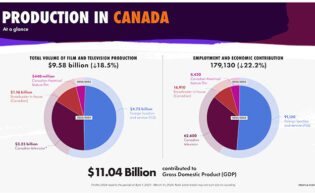The Writers Guild of Canada (WGC) members have voted “overwhelmingly” in favor of authorizing strike action if there is no resolution in its ongoing negotiations with the Canadian Media Producers Association (CMPA).
“This strike authorization vote, a first in the Guild’s 33-year history, represents a pivotal moment for Canadian screenwriters,” said WGC’s executive director, Victoria Shen. “It underscores our members’ commitment to securing fair compensation and meaningful AI protections in an ever-evolving industry.
“While a strong strike mandate does not necessarily mean we will strike, it tells the producers we are ready to defend ourselves if necessary. We remain committed to negotiating a fair agreement for our members.”
The vote—in which 96.5 percent were in favor of a strike mandate—came after nearly six months of negotiations aimed at renewing the Independent Production Agreement (IPA) between the WGC and the CMPA. WGC members have been working without a new contract since December 31, 2023.
The parties have yet to negotiate “meaningful protections” for both live action and animation writers against AI, “reasonable compensation” for animation writers or secure minimum participation of screenwriters during production of television series.
“Our members understand what’s at stake in these negotiations, and I am proud of the strength of their support in this vote,” said Alex Levine, president of the WGC. “We cannot let producers devalue us and our work. We are standing strong and together to secure a future for Canadian screenwriters.”
In response to the WGC strike authorization vote, Sean Porter, the CMPA’s VP of national industrial relations and counsel, said: “The CMPA remains at the table and is committed to a negotiated settlement with the WGC.
“Canadian producers value the work of Canadian screenwriters and sincerely believe that future Canadian projects should be written by humans, not AI algorithms.
“We believe a labor dispute would be extremely damaging to the domestic Canadian film and television production sector, and we remain focused on successfully concluding negotiations.”


